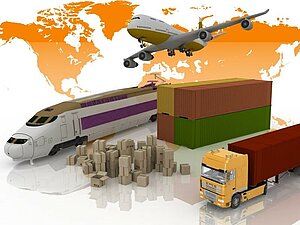Export of goods
Topic description
General

The export of goods means removal of Community goods from the customs territory of the European Union to a third country (land or territory in which the Treaty establishing the European Community is not applied) or a third territory which is not part of the customs territory of the European Union. Depending on the selected export procedure, goods can be intended for definitive export, temporary exportation for outward processing or exhibition at a fair etc. However, when goods are transferred from one Member State to another across the customs territory of third countries, the export procedure is not used.
Before goods are placed under the export procedure, an exit summary declaration (ESD) must be lodged for the goods in question. It is also possible to lodge a regular customs declaration containing all the information required in ESD.
An export declaration is lodged at the financial office responsible for customs supervising the place where the exporter is established or where the goods are packed or loaded for export shipment. In such cases, the exporter is the person on whose behalf the customs declaration is lodged and who is the owner of the goods or has a similar right of disposal over them at the moment when the declaration is accepted.
An export declaration is lodged electronically by means of data-processing technique. Documents required for the performance of an export procedure (an invoice, transit documents, an export licence for agricultural products etc.) are attached to the declaration.
The export procedure comprises customs supervision of the goods, collection of potential export duties, implementation of restrictions and limitations and of commercial policy measures. Pursuant to Article 52 of the Value Added Tax Act, goods intended for export and dispatched from Slovenia are exempt from VAT on condition that the exporter submits sufficient proof of the exit of the goods from the customs territory of the Union.
In some cases, it is not necessary to lodge an electronic customs declaration by means of data-processing technique, because the goods can be exported on the basis of an oral declaration. A customs declaration can be made orally in the case of goods of a non-commercial nature contained in travellers’ personal luggage, goods of a commercial nature provided that their total value does not exceed EUR 1000 and goods of negligible economic importance, where this is authorized by customs authorities.
Details
Legislation
EU legislation
Regulations
- Regulation (EU) No 952/2013 of the European Parliament and of the Council of 9 October 2013 laying down the Union Customs Code
- Commission Delegated Regulation (EU) 2015/2446 of 28 July 2015 supplementing Regulation (EU) No 952/2013 of the European Parliament and of the Council as regards detailed rules concerning certain provisions of the Union Customs Code
- Commission Implementing Regulation (EU) 2015/2447 of 24 November 2015 laying down detailed rules for implementing certain provisions of Regulation (EU) No 952/2013 of the European Parliament and of the Council laying down the Union Customs Code
- Commission Delegated Regulation (EU) 2016/341 establishing transitional rules for certain provisions of Regulation (EU) No 952/2013 of the European Parliament and of the Council, laying down the Union Customs Code where the relevant electronic systems are not yet operational



